By Alexander, Certified Personal Trainer & Strength Coach — Chicago, IL

Fitness is a journey that fits best when it suits your lifestyle, especially in busy American cities like Chicago. Who has time for crowded gyms or expensive memberships? If you’re searching for an effective, no-equipment-required workout that you can do at home—and one that challenges you to push your limits—then you’re in exactly the right place.
This advanced bodyweight workout circuit is designed specifically for busy Americans, including Chicago residents and seniors seeking functional strength and endurance without leaving their homes. It combines science-backed fitness principles, local lifestyle insights, and practical guidance guaranteed to help you build muscle, boost cardiovascular health, and improve mobility.
Whether in a compact city apartment near the Magnificent Mile or a spacious home in the suburbs, this routine will maximize every moment you spend on your fitness goals.
Why Bodyweight Training Is Perfect for the U.S. Lifestyle — And Chicago’s Fitness Scene
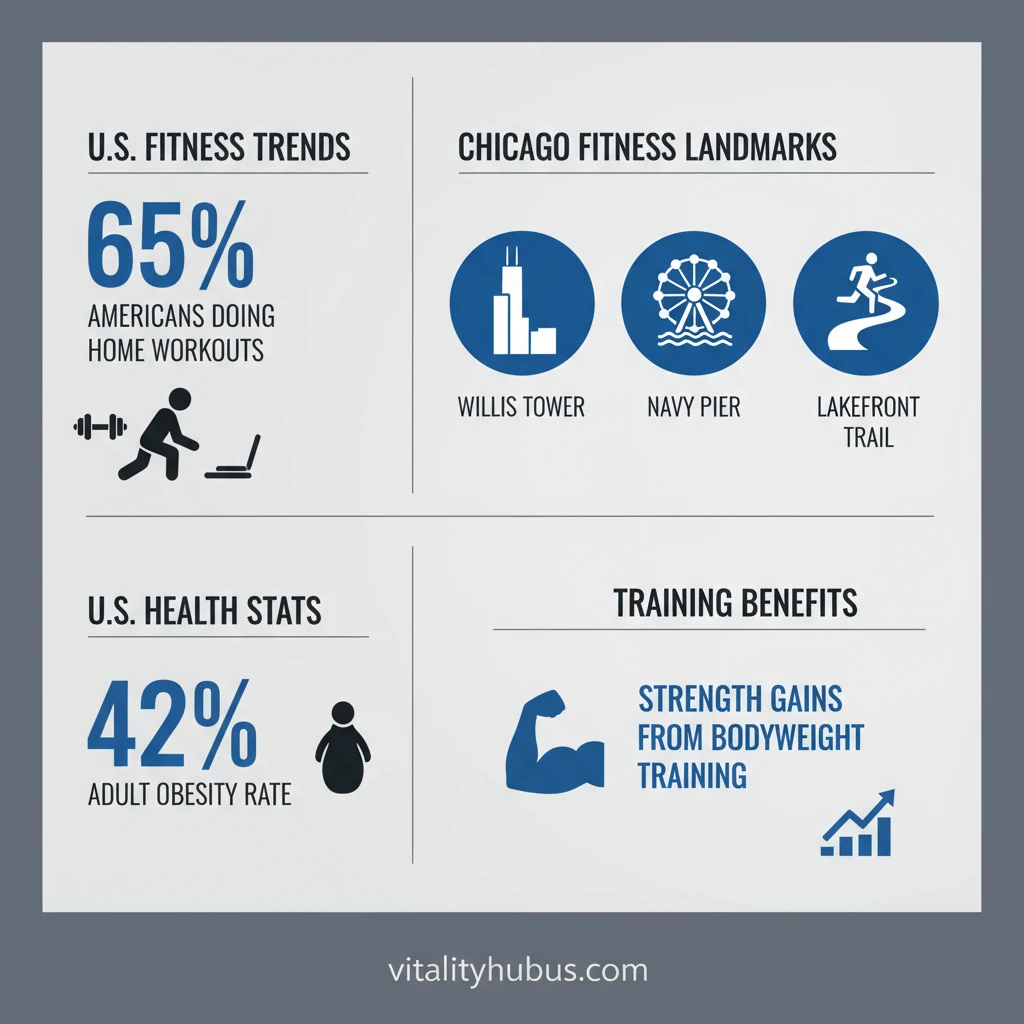
Convenience Meets Effectiveness
Recent surveys (Statista, 2024) report that over 65% of Americans incorporate home workout routines into their weekly schedules—a dramatic increase fueled by convenience, modern fitness trends, and the rise of digital fitness platforms.
Chicagoans, in particular, benefit from a fitness culture that blends indoor strength training with outdoor activities like running or biking along the Lakefront Trail, exploring Millennium Park, or jogging through Lincoln Park. This bodyweight circuit complements these outdoor engagements perfectly by building strength and endurance indoors—readying you to take full advantage of the city’s active lifestyle.
Scientific Backing
According to a 2023 study published in the Journal of Strength & Conditioning Research, participants who engaged in bodyweight circuit training three times a week exhibited an 18% increase in lower body strength and a 12% improvement in cardiovascular endurance over eight weeks. This means you can achieve gym-quality results using your own body weight—no conventional equipment necessary.
The Advanced Bodyweight Circuit — Your Home Workout Blueprint
How This Workout Works
This routine is a circuit training style, which means you move sequentially through each exercise with minimal rest between movements to keep your heart rate elevated. After completing all exercises, rest for about 1-2 minutes, then repeat for 3 full rounds. If you’re feeling ambitious, add a 4th round for an extra challenge.
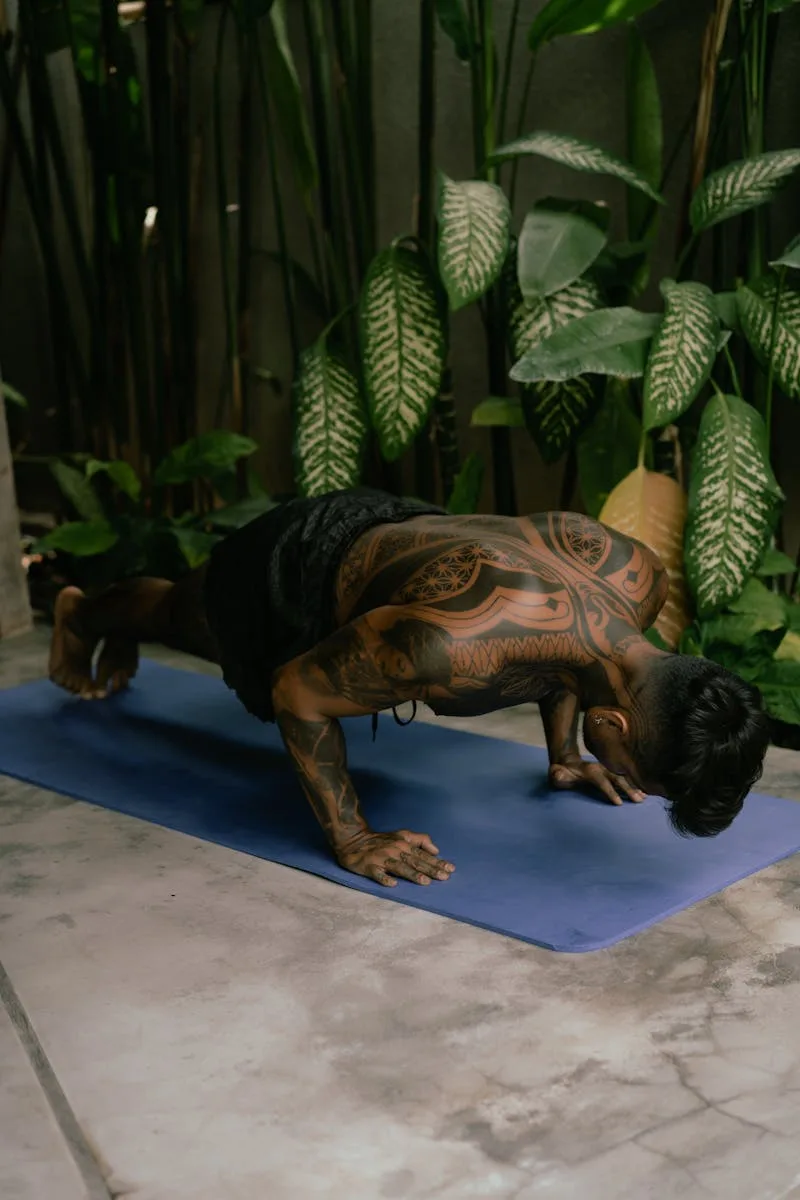
Circuit Exercises Breakdown
- One-Legged Squats (Pistol Squats) — 10 reps per leg
A challenging move focusing on balance, quad, and glute strength. Use a chair or wall for added support as you build confidence. - Bodyweight Squats — 20 reps
Drive your hips back and down like sitting in a chair. This engages your glutes and quads deeply—critical muscles for daily movement and injury prevention. - Walking Lunges — 20 reps (10 each leg)
Take a long controlled step forward, lowering your body into a lunge, keeping your knee behind your toes. This unilateral split movement boosts balance and hip mobility. - Jump Step-Ups — 20 reps (10 each leg)
Explosive plyometric exercise using a sturdy bench or step. It improves power and cardiovascular stamina. - Pull-Ups — 10 reps
Pull your body upward using a sturdy bar or substitute with inverted rows under a strong table. Effective for strengthening the upper back, arms, and core. - Dips — 10 reps
Using two chairs or parallel surfaces, dip down by bending elbows to 90 degrees and then push back up. This strengthens triceps and shoulder stability. - Chin-Ups — 10 reps
Focus on biceps and core control. Assisted variations using resistance bands are encouraged to build strength progressively. - Push-Ups — 10 reps
Maintain a tight core and controlled movement, lowering chest close to the floor. Modify by dropping knees as you build strength. - Plank — Hold for 30 seconds or more
Keep your body in a straight line from head to heels, engaging core muscles to enhance stability and posture.
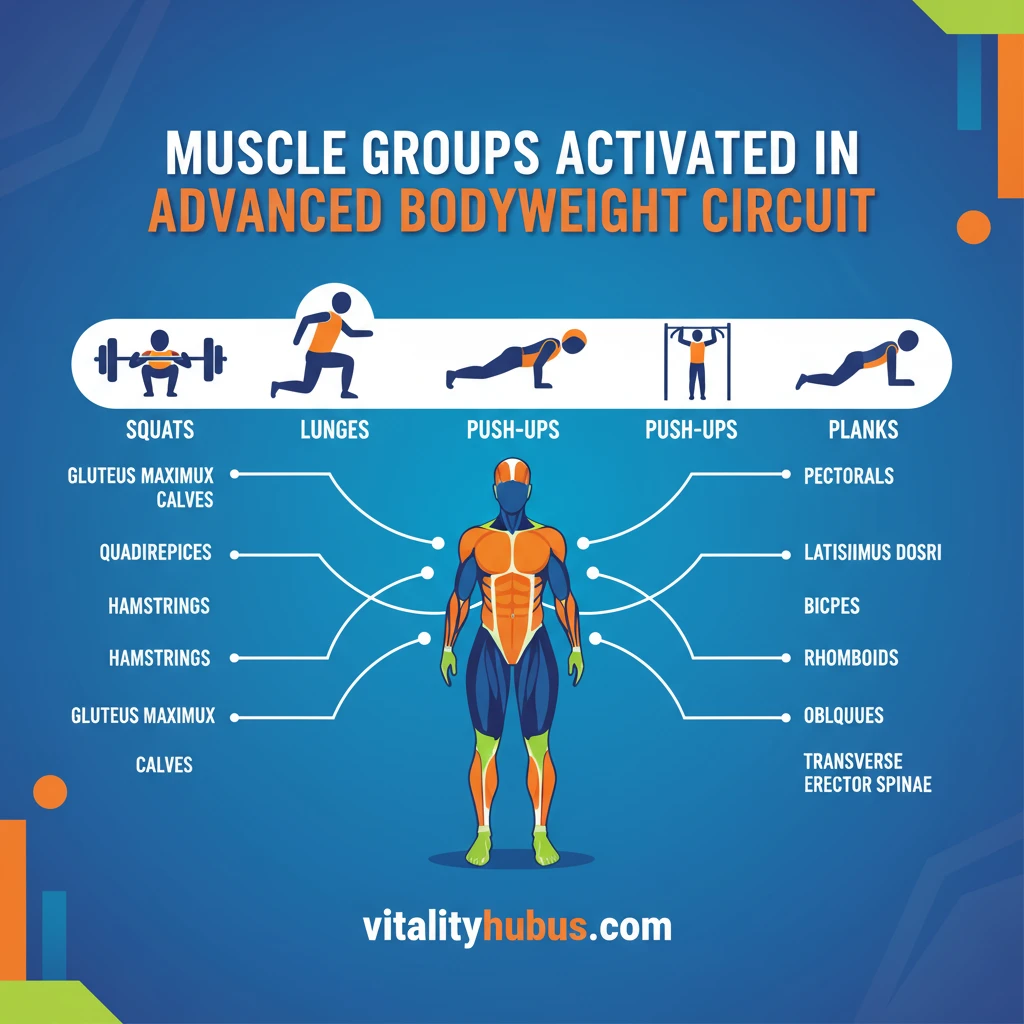
Warm-Up and Cool-Down Routines
Warm-Up (5 minutes)
Start with light cardio such as jogging or marching in place for 2 minutes, followed by dynamic stretches like leg swings and arm circles. Warm up further by activating muscles with 10 push-ups and 20 jumping jacks.
Cool-Down (5-10 minutes)
Finish with static stretches targeting hamstrings, quads, calves, and spinal mobility (cat-cow stretch). Incorporate a 30-second cobra stretch and deep diaphragmatic breathing to aid recovery.
The Science-Backed Benefits for Fitness and Health
Local and National Health Context
Did you know nearly 42% of American adults currently face obesity challenges (CDC, 2023)? For Chicago residents, sedentary office-based jobs are a common barrier to fitness. This workout provides a scalable, equipment-free solution to combat inactivity, burning calories while building strength and endurance simultaneously.
Scientific reviews such as those in the American Journal of Sports Medicine (2022) indicate that bodyweight workouts can result in muscle hypertrophy increases of up to 25% within 6 weeks—a statistically significant improvement comparable to traditional weight training methods.
Additionally, according to behavioral studies published in Health Psychology Review (2024), individuals who log their workouts consistently increase their adherence to exercise programs by 30%, underscoring the importance of tracking your fitness progress.
Practical Tips for Tracking Your Progress and Staying Motivated
- Maintain a workout journal noting the number of circuits completed, reps per exercise, and the time taken.
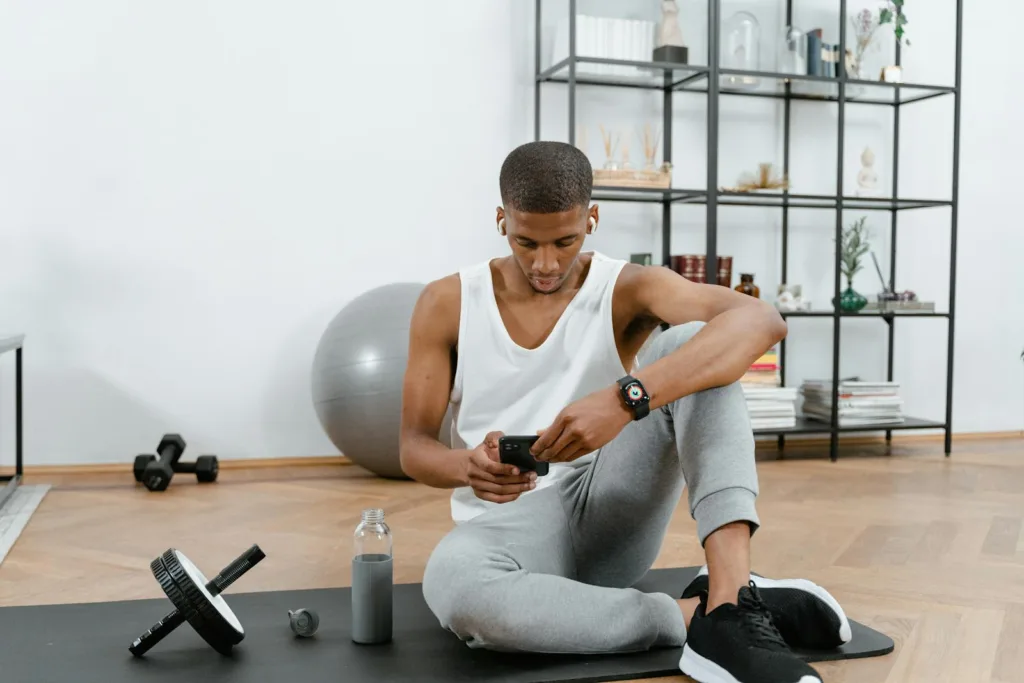
- Set weekly goals and aim to beat your previous performance.
- Sync with fitness apps to visualize progress trends and receive community encouragement.
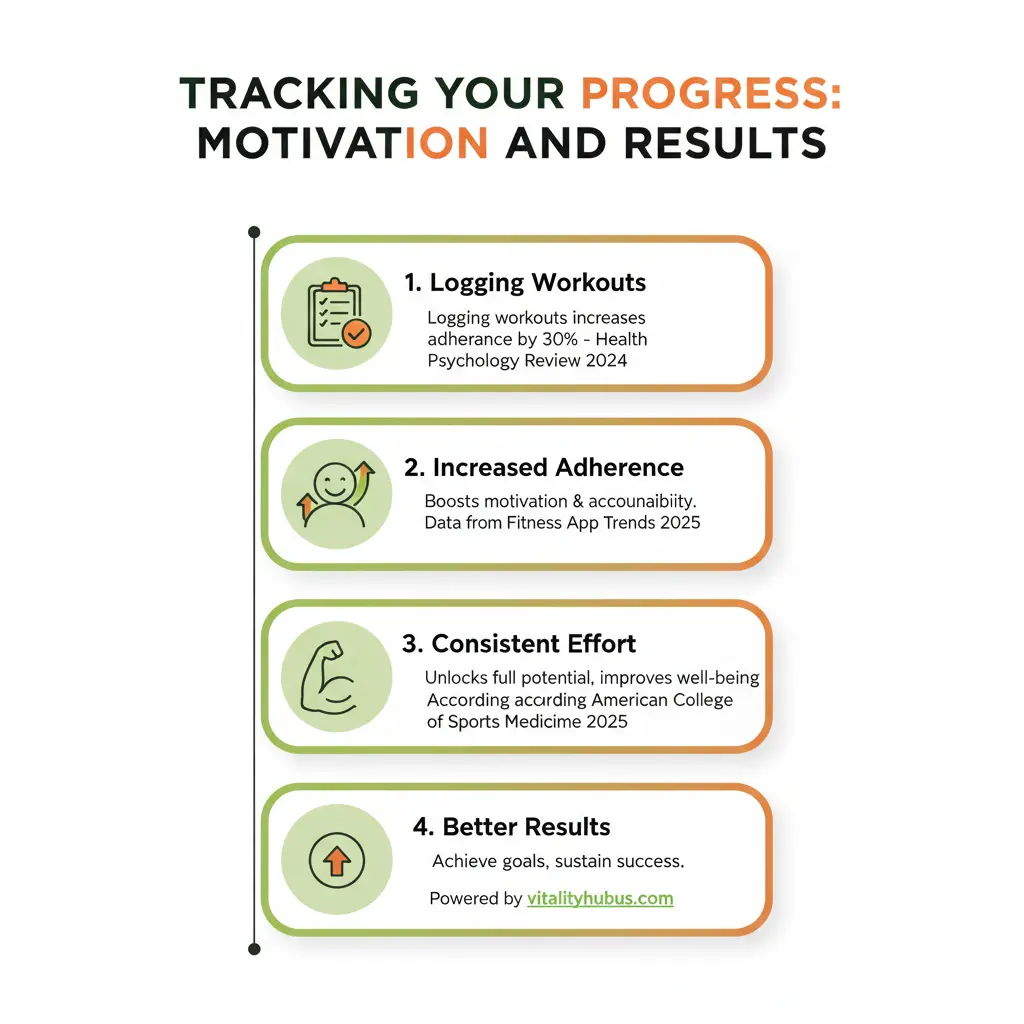
Specific Benefits for Chicago Residents and Busy Americans
Visible strength gains will help you pedal harder on your Chicago bike rides, conquer the steps at Navy Pier, and enjoy brisk walks along the vibrant Riverwalk without fatigue. Combining this routine with other local fitness options like yoga classes in Logan Square or spin sessions in Wicker Park will create a holistic fitness lifestyle that suits Chicago’s diverse, culture-rich community.
Workout Frequency and Sample Schedule
To ensure lasting gains and injury prevention, perform this circuit 2-3 times weekly, complemented by cardio, mobility work, and ample rest.
Sample Schedule:
- Day 1: Advanced Bodyweight Workout
- Day 2: Outdoor cardio (try Chicago’s Lakefront Trail) or active recovery
- Day 3: Rest or gentle yoga/stretching
- Day 4: Repeat bodyweight circuit
- Day 5: Mobility training or light jogging in local parks
Scaling the Workout to Your Needs
- Assistance bands for pull-ups and chin-ups if strength is lacking.
- Knee push-ups for beginners or those returning from injury.
- Progress to weighted backpacks or extra rounds for advanced challenge.
- Adjust plank hold time from 15 seconds up to 60+ seconds.
Frequently Asked Questions (FAQs)
Q1: Can bodyweight training build serious muscle?
Yes, with progressive overload by increasing reps, rounds, or adding weight, muscle growth is achievable and sustainable.
Q2: How fast will I see real results?
Typically within 4–6 weeks with consistent effort and proper nutrition.
Q3: What if pull-ups are too hard for me now?
Begin with inverted rows or use resistance bands to build the required strength progressively.